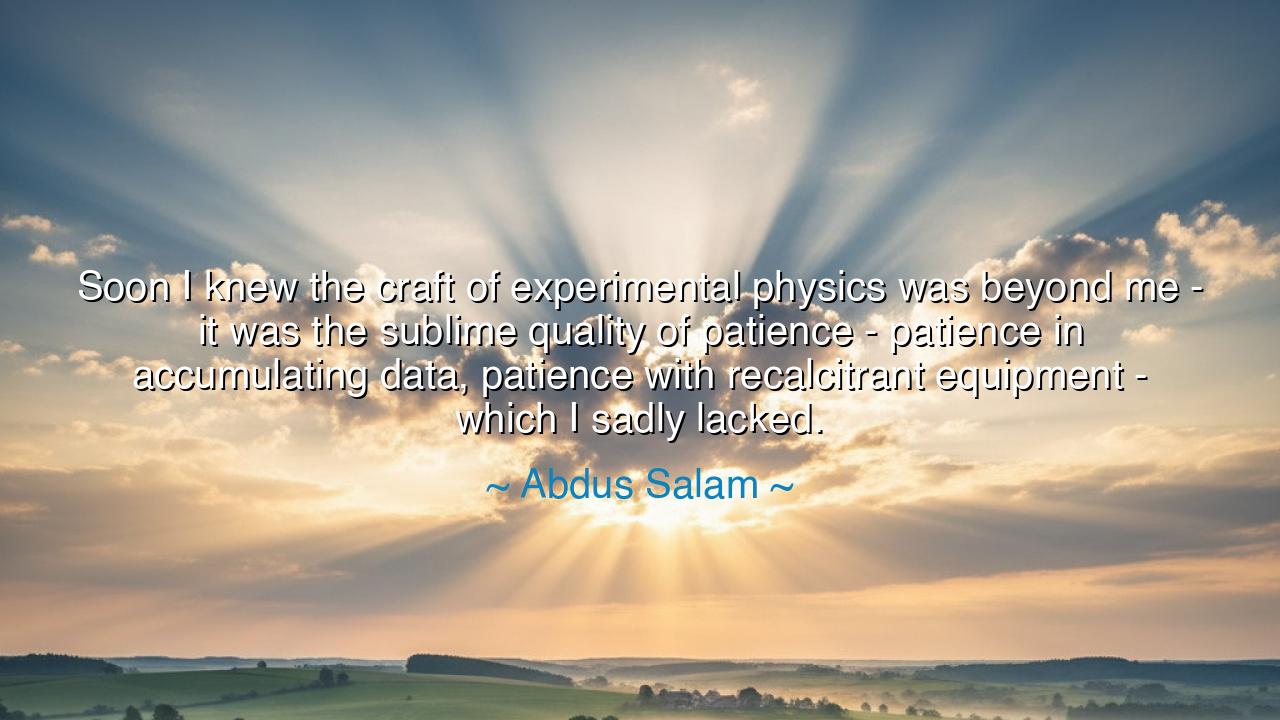
Soon I knew the craft of experimental physics was beyond me - it
Soon I knew the craft of experimental physics was beyond me - it was the sublime quality of patience - patience in accumulating data, patience with recalcitrant equipment - which I sadly lacked.






Hear the voice of Abdus Salam, the Nobel laureate, who spoke with humility and wisdom: “Soon I knew the craft of experimental physics was beyond me—it was the sublime quality of patience—patience in accumulating data, patience with recalcitrant equipment—which I sadly lacked.” These words reveal a truth as old as knowledge itself: that genius is not found in brilliance alone, but in endurance. For the pursuit of truth demands not only fire in the mind, but calm in the soul, the patience to wait, to endure, and to persist when progress seems slow as the drip of water on stone.
From the beginning of inquiry, mankind has divided its labor: the dreamers who see the heavens in vision, and the craftsmen who, by sweat and care, measure the stars one by one. Abdus Salam, gifted in the soaring abstractions of theory, confessed that the long toil of experiment was not his path. He lacked the endless patience that experimental work demands—the waiting upon stubborn machines, the gathering of tiny fragments of data until, at last, truth reveals itself. Thus, his words teach us that knowledge is not one craft, but many, each requiring not only skill, but temperament.
Consider, O listeners, the story of Galileo. Though remembered as the father of modern science, his discoveries were not born in a single night of revelation. Night after night he bent his gaze through his telescope, sketching the moons of Jupiter, watching their tiny movements, recording their dance across the heavens. It was the patience of observation, not only the brilliance of his mind, that gave him the courage to challenge the dogmas of his age. Without this endurance, the truths he saw would have remained hidden in the sky.
Salam’s confession, then, is not weakness but wisdom. He knew that though his soul soared in mathematics, he was not shaped for the long waiting of experiment. This is the mark of humility: to know one’s limits, and to choose the path where one’s gifts bear fruit. And in that choice, he reached heights that changed the world, offering theories of unification that revealed new symmetries in the fabric of the cosmos. His lack of patience in one field became the very reason for his greatness in another.
So must we, too, learn this lesson: that no soul is fashioned to master all things. The artist may lack the patience of the farmer; the warrior may lack the stillness of the monk. Yet each has their place, and each contributes to the whole. To recognize where one is strong, and where one is weak, is not failure, but the beginning of wisdom. For the world requires both those who endure the grind of equipment and data, and those who dream beyond it, shaping visions that inspire.
Yet let us not despise patience, for even if we are not born with it in great measure, it is a virtue that can be trained. Like a muscle, it grows through practice. To sit quietly in labor, to endure the small irritations of tools that falter, to bear the long delays between question and answer—these are disciplines of the spirit as well as the mind. Even if Salam turned away from experiment, his words remind us that without patience, no great craft can endure.
The lesson is plain: seek to know yourself, as Salam did. Ask: “Where does my spirit thrive, and where does it wither?” If you are made for patience, let it be your strength; if you are not, direct your gifts where they bear the richest fruit. But in all things, honor the work of others, knowing that their strength balances your weakness. And practice small acts of patience daily, that you may grow in this virtue, for though not all are called to labor with stubborn machines, all are called to endure the trials of life.
Therefore, O children of wisdom, remember the words of Abdus Salam. For they remind us that brilliance without patience is incomplete, and that humility is as noble as triumph. Walk your path with courage, but know when it is not yours to tread. Honor those whose slow labor builds the foundation, even as you soar in vision. And in this balance, you shall find not only success, but the peace of knowing you have lived according to the measure of your spirit.






AAdministratorAdministrator
Welcome, honored guests. Please leave a comment, we will respond soon